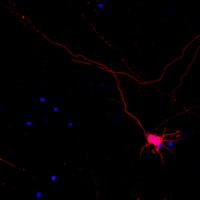Epigenomic Analysis of Multilineage Differentiation of Human Embryonic Stem Cells.
Xie, Wei, et al.
Cell, (2013)
2013
Show Abstract
Epigenetic mechanisms have been proposed to play crucial roles in mammalian development, but their precise functions are only partially understood. To investigate epigenetic regulation of embryonic development, we differentiated human embryonic stem cells into mesendoderm, neural progenitor cells, trophoblast-like cells, and mesenchymal stem cells and systematically characterized DNA methylation, chromatin modifications, and the transcriptome in each lineage. We found that promoters that are active in early developmental stages tend to be CG rich and mainly engage H3K27me3 upon silencing in nonexpressing lineages. By contrast, promoters for genes expressed preferentially at later stages are often CG poor and primarily employ DNA methylation upon repression. Interestingly, the early developmental regulatory genes are often located in large genomic domains that are generally devoid of DNA methylation in most lineages, which we termed DNA methylation valleys (DMVs). Our results suggest that distinct epigenetic mechanisms regulate early and late stages of ES cell differentiation. | 23664764
 |
Centrosome amplification causes microcephaly.
Marthiens, Véronique, et al.
Nat. Cell Biol., (2013)
2013
Show Abstract
Centrosome amplification is a hallmark of human tumours. In flies, extra centrosomes cause spindle position defects that result in the expansion of the neural stem cell (NSC) pool and consequently in tumour formation. Here we investigated the consequences of centrosome amplification during mouse brain development and homeostasis. We show that centrosome amplification causes microcephaly due to inefficient clustering mechanisms, where NSCs divide in a multipolar fashion producing aneuploid cells that enter apoptosis. Importantly, we show that apoptosis inhibition causes the accumulation of highly aneuploid cells that lose their proliferative capacity and differentiate, thus depleting the pool of progenitors. Even if these conditions are not sufficient to halt brain development, they cause premature death due to tissue degeneration. Our results support an alternative concept to explain the etiology of microcephaly and show that centrosome amplification and aneuploidy can result in tissue degeneration rather than overproliferation and cancer. | 23666084
 |
SMAD4 is essential for generating subtypes of neurons during cerebellar development.
Fernandes, M; Antoine, M; Hébert, JM
Developmental biology
365
82-90
2012
Show Abstract
Cerebellum development involves the coordinated production of multiple neuronal cell types. The cerebellar primordium contains two germinative zones, the rhombic lip (RL) and the ventricular zone (VZ), which generate different types of glutamatergic and GABAergic neurons, respectively. What regulates the specification and production of glutamatergic and GABAergic neurons as well as the subtypes for each of these two broad classes remains largely unknown. Here we demonstrate with conditional genetic approaches in mice that SMAD4, a major mediator of BMP and TGFβ signaling, is required early in cerebellar development for maintaining the RL and generating subsets of RL-derived glutamatergic neurons, namely neurons of the deep cerebellar nuclei, unipolar brush cells, and the late cohort of granule cell precursors (GCPs). The early cohort of GCPs, despite being deficient for SMAD4, is still generated. In addition, the numbers of GABAergic neurons are reduced in the mutant and the distribution of Purkinje cells becomes abnormal. These studies demonstrate a temporally and spatially restricted requirement for SMAD4 in generating subtypes of cerebellar neurons. | 22370000
 |













